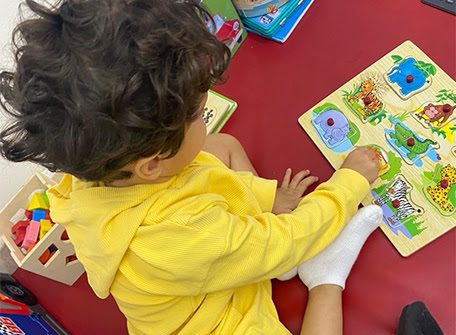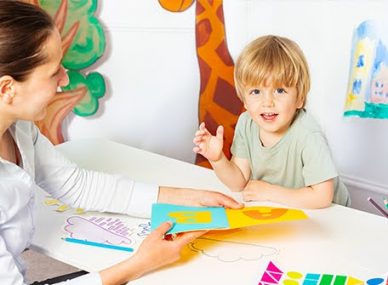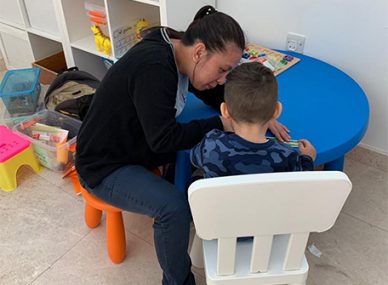Rolling over, sitting up, crawling, walking, eating, babbling, talking, and toilet training are all crucial developmental abilities that babies and toddlers learn as they grow up. However, some children may take far longer than predicted to reach one or more of these developmental milestones.
If your kid exhibits any of the following indicators at the age specified, contact your child’s doctor or call our office to speak with one of our pediatric therapists at Hope AMC in Dubai.
When you pay attention to your child’s interactions, such as his or her emotional responses or speech, you may be able to spot underlying problems earlier on and initiate behavioral therapy (ABA) for your child.
Developing children can be divided into four categories:
- Speech and language delays
- Motor skills
- Social development
- Cognitive skills
Even mild delays in achieving developmental milestones in children can be spotted early, and it’s crucial to be mindful that developmental milestones must be met in order to avoid any hindrances.
The Cause and Effects of Childhood Language and Speech Delays?
Children’s speech and language develop during their early years, interacting with other aspects of their lives. Many factors can contribute to speech and language delays in children, including developmental disorders and hearing impairments. During speech therapy, you can distinguish hearing issues from speech and language delays in children. Delays in language development can prevent a child from making friends, cause unwanted behavior, and lead to low academic performance.
Here are a few examples of childhood communication disorders and delays:
- Childhood apraxia of speech – a condition characterized by an inability to perform speech movements according to a sequence.
- Expressive language delays – inability to communicate using words.
- Late talkers – describes a low spoken vocabulary compared with peers.
- Learning disabilities – inability to read, write, or spell correctly.
- Dysarthria – a condition in which the voice is weak.
The best way to spot red flags in your child’s development is to learn how to spot them even if they do not show any signs of developmental delay. With a better grasp of how speech and language develop in childhood, you will be able to better support your child’s speech and language needs, and you will also know when to seek a speech therapist’s help.
Identifying Early Language Delays
Speech and language difficulties in children can manifest themselves in a variety of ways. You can detect early signs of any problems by being a vigilant and engaged caretaker. When speaking with youngsters, we often use exaggerated expressions for a cause. Children are constantly learning and absorbing information from their environment. These exaggerated expressions encourage youngsters to imitate, which is an important aspect of speech and language development in early childhood. Language difficulties can be detected as early as two months old, and possibly much earlier.
A lack of imitation, lack of eye contact, or even non-responsiveness can be symptoms of language problems, though non-responsiveness could also be a sign of hearing issues. These channels of communication can be seen as early as infancy. Cooing or babbling is the first evidence of a child’s ability to communicate. If your child isn’t chattering, using gestures, or making eye contact with you during play, he or she may be experiencing a speech or language delay.
Late Talkers
Toddlers between the ages of 18 and 30 months will begin speaking in small, shorter sentences; this is typical and not a sign of a late talker. Limited childhood speech after the age of 30 months is referred to as a late talker language delay. At whatever age your child begins to desire to speak and try to create sentences, you can start looking for indicators of a late talker speech delay. Though it’s normal for kids to get their words or meanings mixed up now and again, this could indicate that they’re late talkers. Word misunderstanding or mix-up is common among late talkers. This confusion can have a lasting impact on children’s academics, social relations, and overall level of confidence speaking if it is not resolved by preschool age.
Comprehending difficulties, restricted gesture use, and family history are all risk factors for becoming a late talker child in childhood. If you observe any of these symptoms, it’s time to seek speech therapy help. Childhood If left untreated, speech and language deficits can lead to serious problems, thus early intervention in the form of speech therapy is essential. After a social engagement and social exposure, a late talker’s language deficits may or may not be remedied, thus it’s advisable to seek speech therapy at the first sign of late talkers.
If your child is experiencing language delays, seek speech therapy. Consult a speech therapist as soon as possible. When your child’s speech and language delays are addressed quickly and appropriately, you can make a big difference in his or her development. A speech therapist can help late talkers make rapid progress. A speech therapist can provide you with more information on alternative communication strategies for late talkers.
Speech therapists can develop individualized plans of care for children who have other types of speech and language delays. Environments and interactions can be crucial to their growth and development. Speech therapists help parents adjust the environment and interact with their children to maximize the benefits of children’s speech and language development.
Speech therapy can help children to overcome their disorders or difficulties at an early age, no matter how late they talk or how troubled they spell. Speech therapists may also be able to determine if children’s speech delays could be indicative of a neurological condition, such as autism. We will discuss ABA therapy later on, in this case, suggested by a speech therapist.
Delayed Motor Skills
Childhood development looks at gross motor skills and fine motor skills. A gross motor skill involves moving with the bulkiest muscles. Sitting, walking, and balancing are examples of gross motor skills. In other words, fine motor skills are required for more complex tasks, like eating, playing, and writing.
During the first year of life, children work on gross motor skills and then progress to more refined motor skills later on. In addition to providing a foundation for more advanced fine motor skills, gross motor skills serve as an important part of a child’s development.
It can Manifest in a Number of Different Ways:
- Delayed maturation
- Disbalance
- Discoordination
Delayed maturation relates to the ability to employ gross motor skills, which should occur within a reasonable range of certain milestones. Disbalance is a term that describes a child’s difficulty to maintain balance while sitting or standing. A child’s ability to sit upright, stand, walk, and do so much more depends on their ability to maintain balance. A child with poor coordination is unable to move all of their body parts effectively. Most children, particularly those learning to walk, will appear ungainly and off-kilter as they learn to balance. The inability to coordinate results in poor performance in gross motor abilities.
Tips on Improving Your Kid’s Motor Skills
Playtime, tummy time, promoting crawling, and sensory activities can all assist your infant to improve their gross and fine motor abilities. During feedings, infants practice their gross motor skills. Young children can develop their gross motor abilities by reaching for a bottle or feeding themselves with utensils or their fingers.
Children will begin to identify their fine motor skills as they acquire their gross motor skills. Arts and crafts, sports, and interactive toys are just a few of the playtime activities and games that can help children hone their fine motor skills.
Delays in the Development of Social and Emotional Skills
Different communication skills are constantly being learned and developed by children. Their social development and abilities are primarily learned in situations that need them to engage with new people, such as a playdate, starting school, or going to daycare. In certain social contexts, a child’s emotional skills have a role in how he or she communicates.
When dealing with adverse encounters, such as playing with another child who refuses to share, a youngster will develop social and emotional skills. Children learn how to respond to situations effectively by developing social and emotional skills at an early age.
Delays in Social and Emotional Development Can Manifest as the Following Behaviors:
- Social awkwardness
- Lack of ability to initiate a conversation
- Coping difficulties
- Outbursts or tantrums of prolonged duration
Parents may notice these behaviors if their child is having social or emotional developmental delays. Children will require additional support and coaching to handle these behaviors in this scenario. A therapist will teach youngsters how to change their reactions when confronted with new social and emotional obstacles.
Communicating and socializing with others might be challenging if you lack the necessary social and emotional abilities. Children with autism can benefit from ABA therapy to improve their verbal abilities and social skills.
Cognitive Development Red Flags
In terms of childhood development, cognitive delays are undoubtedly the most problematic. In addition to affecting a child’s speech and language skills, cognitive delays also affect their social and emotional development. Infancy is when cognitive delays occur.
Look for These Signs to Spot Cognitive Delays Early on:
- Lack of interest in playtime
- Disinterest in the environment
- Slow to respond
- Lack of curiosity
A speech therapist can help you and your kid get back on track if your child is showing signs of cognitive difficulties or other developmental delays. Cognitive growth can potentially indicate the presence of a condition, such as autism. In this instance, an ABA therapist may be recommended. Before assuming any issues originating from a childhood speech and language delay, get the advice of a reputable and licensed speech therapist.
ABA Therapy for Autism Disorder
In some circumstances, delays in achieving developmental milestones in children are a symptom of a more serious problem or disorder that may benefit from ABA therapy. ABA therapy focuses on the different behaviors that may affect a child’s surroundings with an autism diagnosis, whereas speech therapy focuses on communicating both verbal and nonverbal language. ABA therapists deal with both parents and children with autism to help them better assist their children who have autism.
An ABA program adapts to each child’s specific needs. Children learn new skills from ABA therapy that can be applied to a variety of situations and settings within the context of different people. A professional therapist will explain how you can help your child in ABA therapy, such as how routines can benefit your child with autism and how mindfulness can help.
The ABA therapy program at Hope AMC Medical Center in Dubai incorporates the psychological propensity that if a behavior is rewarded by something the child values, he/she will be more likely to repeat it in the future, and this will gradually lead to positive behavioral change. This approach is a positive reinforcement approach strategy, an important wing of this therapy.
Children with developmental delays need to be treated as soon as possible. The delays in achieving developmental milestones can be corrected with early intervention in speech therapy and ABA therapy. ABA therapy helps your child overcome developmental delays by modeling, repetition, and positive reinforcement.





